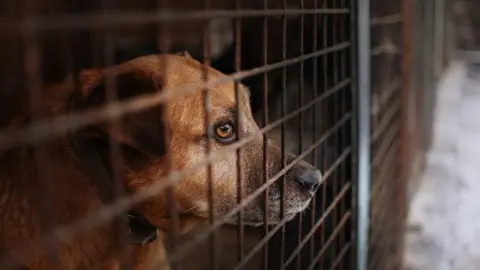In a significant public health warning, the Royal Society for the Prevention of Cruelty to Animals (RSPCA) has raised alarms regarding the risks posed by imported dogs in the United Kingdom. The charity has called for stringent licensing regulations for dog rescue organizations, amid escalating concerns over behavioral disorders and potential disease transmission from imported canines. With thousands of dogs being brought into the UK annually, often through informal channels such as social media, the RSPCA highlights a worrying trend that demands immediate governmental intervention.
Reports indicate that many dogs come from countries like Romania, Ukraine, and North Macedonia, with countless cases where owners have encountered severe issues linked to these pets. Owners have reported infectious diseases and undesirable behavioral traits that stem from a lack of rigorous assessment and matching processes prior to adoption. David Bowles, speaking for the RSPCA, likened the current state of dog imports to a “Deliveroo for dogs,” underscoring the alarming casualness involved in such critical transfers of responsibility.
Currently, the situation varies considerably across the UK; while Scotland mandates licensing for rescue organizations, no such regulations exist in England, Wales, or Northern Ireland. This inconsistency raises serious concerns about animal welfare and public safety, particularly as rescue organizations operate through minimal vetting processes. A BBC investigation uncovered shocking practices, revealing that various rescue groups were willing to arrange dog adoptions following brief phone calls and the filling out of basic application forms, often without a proper assessment of the dog’s behavior or the owner’s readiness for adoption.
In reviewing online ads, a staggering number were found to feature dogs from Eastern Europe, with many offering home delivery options for the adopted dogs. While these operations may be run by well-meaning individuals, experts warn that the lack of preparation for potential owners leads to an unpredictable situation where the temperament of the newly adopted dogs remains unknown.
Health concerns are intensifying, with Mr. Bowles expressing fears that these “ticking time bombs” could introduce diseases that threaten not only the new dogs but entire populations of pets and their owners in the UK. There have been increasing instances of Brucella canis, a disease that can be transmitted to humans, being recorded among imported dogs. Although the disease is rare, the number of cases has risen significantly, leading to concerns that the importation process is insufficiently regulated.
A heart-wrenching personal account from Trudy Cain, a dog owner from Alfreton, Derbyshire, illustrates the real risks; after adopting a rescue dog from Romania, she discovered her pet was Brucella-positive. This condition has resulted in increased medical expenses and concerns for her family’s health, showcasing the harsh realities for families who wish to provide a loving home for these dogs.
The situation has also been compounded by issues surrounding proper documentation during imports. Sian Keen’s experience with her pregnant rescue dog illustrates this further: all dogs at her home were seized due to suspicions of forged medical documents, resulting in distressing quarantine measures. Following her dog’s return from quarantine, its behavior changed dramatically, leading to aggressive outbursts that resulted in painful injuries for Sian and her child.
The RSPCA has called for an urgent review and implementation of laws to regulate the import and adoption of dogs. The organization urges the public to consider the responsibilities of dog ownership carefully and explore local, reliable adoption channels. The need for licensing dog rescue organizations is paramount to better safeguard both animal welfare and human health in the UK as it grapples with the ramifications of unhindered canine importation.
This critical discourse pushes for a balance between the noble cause of rescuing dogs in distress and the safety of pet owners and the broader community, ensuring that both animal welfare and public health considerations are placed at the forefront of any future policies regarding canine imports. The dialogue surrounding this issue must continue to evolve, aligning with best practices in animal rescue and responsible pet ownership.












